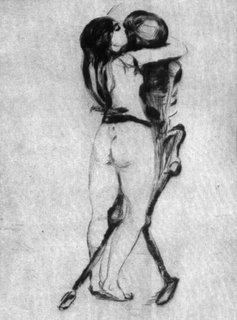
Wise Blood
This is truly one of the most bizarre and strange stories I've ever read. However that keeps it really interesting.
Questions I've come up with so far:
Who is Hazel Motes and why does he lead such a miserable life?
Who is Enoch Emory? What is the importance of his eventual discovery of the gorilla suit?
To me the gorilla suit represents Enoch's transformation which parallells Motes's transformation. Both see something that is false and then choose to immitate it and become it perhaps suggesting that the unreal has the power to overcome the real. Perhaps this relates to the class discussion of which is more important, the reality or the imagined.
The theme of coffins seems to persist throughout the novel. Hazel feels as if he is in a coffin when riding on the train, he sees the dead woman in the coffin at the fair, and the real animals within the novel are all caged, a condition similar to those in the coffin. My first guess is that this condition is related to the condition of Motes and Emory, who seem to have to blindly follow their destiny as if they are trapped within it. For a novel that deals so much with the absence of God there is a strange notion of Divine Providence, as if someone is orchestrating the puppet show. Why does Emory consistently follow his blood. Why is Motes led to Emory, why did he find Asa Hawkes, why is he incapable of leaving the town?
What is the importace of the owl at the end of the zoo? He is molting and in poor condition. The owl is typically a sign of knowledge, so is knowledge then abandoned from that poin onward? Perhaps it is symbolic of the last place both Emory and Motes can avoid their inextricable fate.
What is the importance of eyes, and blindness? The eyes are typically seen as a window to the soul. Sabbath Hawkes eyes are green representing her as earthly, a place of renewal, and virtuous. She is paired with Motes whose brown eyes represent his dullness, barrenness, and place where nothing fertile can grow.
Nothing grows in the desert, which brings up the point of the mumified person. I am not even going to try and examine this one except that its likeness to Christ threatens Motes and his belief in the Church Without Christ.
Why does Motes have such a strong liking for masochism? Perhaps he is seeking pennance but for what? What was recently deemed a sexual perversion, maschoism has long been a part of a spiritual tradition, seeking enlightenment through pain. Why is one so concerned with living without Christ finding such great thrills in abusing himself. My only conclusion is that Motes lives an ever-repentant life, he cannot accept himself as a man who could dissappoint Christ so he must live without Christ. Yet he is still propelled by a feeling of shame and a desire for repentance. His denial of Christ is really a complete acceptance of Christ for the opposite of love is ambivilence, not hate. His hatred acknowledges that he does believe in God and Christ but because he feels he has failed them both so he must respond not by merely forgetting God, like so many do, but by campaigning against him yet still acknowledging that he cares enough to campaign. It is a very interesting dualism, and it makes Motes all the more interesting as the novel progresses

0 Comments:
Post a Comment
<< Home